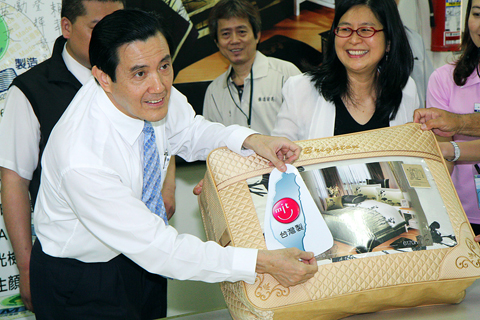President Ma Ying-jeou (馬英九) yesterday said his remark that Taiwan would “never” ask the US to fight for Taiwan in a war was made because he was confident there would be no war in the Taiwan Strait during his presidency.
Chinese Nationalist Party (KMT) spokesman Su Jun-pin (蘇俊賓) quoted Ma, who doubles as KMT chairman, as saying after the party’s closed-door Central Standing Committee meeting yesterday that he sought to turn Taiwan from a “troublemaker” to a peacemaker.
“The President has the utmost confidence in peace across the Taiwan Strait and believes that there will not be war while he is in office,” Su said. “If there is no war in the Taiwan Strait, we definitely will not ask the US to fight for Taiwan.”

PHOTO: CNA
Ma caused a stir when he said Taiwan would “never ask the Americans to fight for Taiwan” during an interview with CNN’s Christiane Amanpour last week. Ma said in the interview that the risk for the US was at its lowest in 60 years, which he credited to his administration’s efforts to improve cross-strait relations.
Su yesterday said the Ma administration would continue to procure arms from the US to protect the country’s security and to manifest its resolve to defend itself.
“We will not let our guard down and will remain prepared against war despite cross-strait detente,” Su quoted Ma as saying.
Su said Ma also said that the reason he spoke English during the interview was because translation would have taken up too much of the interview time.
Meanwhile, the Washington-based Formosan Association for Public Affairs (FAPA) criticized Ma for what it said was inviting “aggression” from China.
The group said it was “deeply concerned” about the “never” remarks made by Ma during the CNN interview.
FAPA president Bob Yang (楊英育) said Ma’s remarks were totally at odds with the basic US policy of strategic ambiguity.
Under the policy, China is meant to be left guessing at how the US would respond to an attack on Taiwan. That uncertainty was designed to act as a strong deterrent against provocative action.
“Ma’s remarks leave China with the impression that this ambiguity is removed, thereby undermining the deterrence provided by the US presence in the region,” Yang said.
In a prepared statement, Yang said: “We are clearly in favor of a peaceful resolution, but that can only be achieved if Taiwan shows the resolve to defend itself. The statement made by Ma actually invites aggression from China, which has been threatening Taiwan’s free and democratic existence for many years.
“It amounts to pre-emptive surrender by the Chinese Nationalist Kuomintang [KMT] government in Taiwan,” he said.
Yang said Ma’s remarks “fly in the face” of US commitments under the Taiwan Relations Act, which commits the US to maintain the capacity to resist any resort to force or other forms of coercion that would jeopardize the security or the social or economic system of Taiwan.
FAPA, a US-wide organization with substantial support in the Taiwanese community, believes that it is essential for Ma to issue a clarification and to state that his administration “adheres to the basic policies on which the strong relations with the US are based.”
Yang also called on Ma to “refrain from making any moves which undermine Taiwan’s freedom, democracy and independence.”

A preclearance service to facilitate entry for people traveling to select airports in Japan would be available from Thursday next week to Feb. 25 at Taiwan Taoyuan International Airport, Taoyuan International Airport Corp (TIAC) said on Tuesday. The service was first made available to Taiwanese travelers throughout the winter vacation of 2024 and during the Lunar New Year holiday. In addition to flights to the Japanese cities of Hakodate, Asahikawa, Akita, Sendai, Niigata, Okayama, Takamatsu, Kumamoto and Kagoshima, the service would be available to travelers to Kobe and Oita. The service can be accessed by passengers of 15 flight routes operated by

Chinese spouse and influencer Guan Guan’s (關關) residency permit has been revoked for repeatedly posting pro-China videos that threaten national security, the National Immigration Agency confirmed today. Guan Guan has said many controversial statements in her videos posted to Douyin (抖音), including “the red flag will soon be painted all over Taiwan” and “Taiwan is an inseparable part of China,” and expressing hope for expedited reunification. The agency last year received multiple reports alleging that Guan Guan had advocated for armed reunification. After verifying the reports, the agency last month issued a notice requiring her to appear and explain her actions. Guan

GIVE AND TAKE: Blood demand continues to rise each year, while fewer young donors are available due to the nation’s falling birthrate, a doctor said Blood donors can redeem points earned from donations to obtain limited edition Formosan black bear travel mugs, the Kaohsiung Blood Center said yesterday, as it announced a goal of stocking 20,000 units of blood prior to the Lunar New Year. The last month of the lunar year is National Blood Donation Month, when local centers seek to stockpile blood for use during the Lunar New Year holiday. The blood demand in southern Taiwan — including Tainan and Kaohsiung, as well as Chiayi, Pingtung, Penghu and Taitung counties — is about 2,000 units per day, the center said. The donation campaign aims to boost

The Central Weather Administration (CWA) said a magnitude 4.9 earthquake that struck off the coast of eastern Taiwan yesterday was an independent event and part of a stress-adjustment process. The earthquake occurred at 4:47pm, with its epicenter at sea about 45.4km south of Yilan County Hall at a depth of 5.9km, the CWA said. The quake's intensity, which gauges the actual effects of a temblor, was highest in several townships in Yilan and neighboring Hualien County, where it measured 4 on Taiwan's seven-tier intensity scale, the CWA said. Lin Po-yu (林柏佑), a division chief at the CWA's Seismological Center, told a news conference